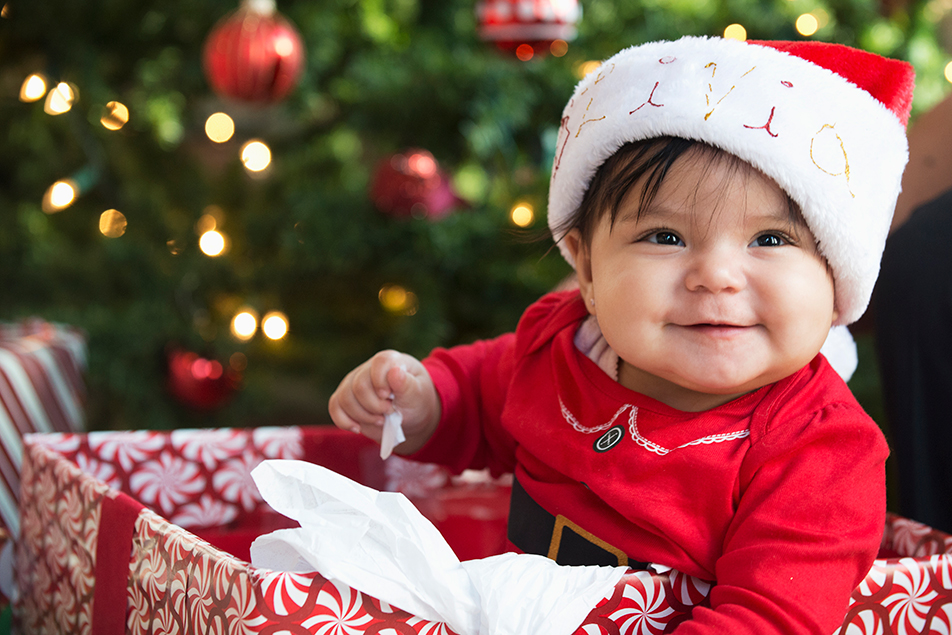
One tradition many of us can count on during the holidays is navigating a full agenda. Family traditions and gatherings can mean attending two or more celebrations a day! For those with a newborn or small baby, this can lead to unwanted stress or illness for their little one. We asked Barbara Sagoe, MD, PPG – Pediatrics, to share her tips for keeping baby healthy and happy this holiday season.
How do big social gatherings put baby at risk?
First of all, it’s important to understand that these guidelines are not all inclusive. There will be things that work for you that don’t work for others, and that’s OK. This time of year, there are a lot of infections going around. Babies are cute and everyone wants to hold and touch them, and sometimes, with good intentions, we put the child at risk.
Colds and influenza, which can be very dangerous for little babies, are common this time of year. The scary thing is, people won’t show symptoms, but they already have the infection. This is known as “being in the incubation period”. That’s one argument for limiting how much people can touch or kiss the baby.
Another risk, not just around the holidays, is herpes infection. Exposure isn’t as dangerous for older children, but very dangerous for babies, who can get anything from skin rashes to meningitis from exposure. People might have a cold sore that can be easily seen, or not have any visible symptoms. They might have lesions somewhere else, but they’ve touched them and then touch baby, which can spread the infection.
Another thing to consider is that not everyone gets their immunizations. This can lead to a child developing illnesses like pertussis (whooping cough). An adult might not be showing any symptoms of illness, because they have an immunity to what they’re carrying, but it’s very likely that little one will not have that same immunity.
Most parents don’t realize it, but babies get very overwhelmed. Different sounds, smells and faces can put a lot of stress on them. They can easily become irritable when being passed around or touched too much.
What is the best way to set boundaries?
The parents will need to decide, together, what they deem to be appropriate and inappropriate. It’s important for mom and dad to discuss it, that way there’s no confusion when a situation arises. Have a plan and an agreed list of limitations. Just make sure you’re on the same page.
This might mean that those who haven’t gotten their flu shot or other immunizations, are not allowed to hold the baby. Or that everyone who touches the child has to wash their hands first. Remember, hand sanitizer doesn’t replace hand washing, but if you don’t have the option, hand sanitizer is better than nothing at all.
Set the expectation. For example, you might have to let your loved ones know that you might not be able to attend all of the gatherings this year. A lot of people have multiple parties, and that might have been your tradition, for years, but it’s not always possible with a new baby. Set your own family tradition in your home or have people come to you.
Remember, it’s OK to say no. It’s difficult for a lot of people, but you know the needs of your child, and they always come first. Maybe that means you just choose one celebration this year. But remember to give the host plenty of notice, as they might be planning on you for the gathering.
Don’t leave any room for ambiguity. Use clear words and be honest and upfront about your rules and boundaries.

How can parents keep their baby healthy this time of year?
Babies under six months, particularly under two months, of age are so vulnerable. There isn’t too much you can do to protect them, aside from limiting exposure. Most stores are so busy this time of year, and there are so many people coming and going. Many of them are sick, and you can’t guarantee they’re taking the right precautions. When people touch carts, products, etc. they transfer infections, especially the flu and pertussis. Wipe down your cart and, if possible, leave baby at home.
The other line of protection is vaccination. Keep your little one, and any adults who are going to be around baby, up to date on all vaccinations to protect against disease.
Those mothers who can breastfeed, it’s highly recommended. There are protective antibodies in breast milk that can be transferred to baby.
How will I know if my baby is sick?
If a child under 3 months has any fever, they should be seen. We consider a fever to be anything higher than 100.3 degrees. The best way to measure a baby’s fever is rectally, but we know that not all parents are comfortable with that. Just be sure to indicate the mode in which you took the temperature when you speak to a healthcare provider. A fever could mean meningitis, a cold or something else. Under three months, any fever is dangerous and the baby should be evaluated.
The baby should also be seen if he/she is not eating well, if they seem lethargic, irritable or more tired than normal. Also if there’s a decrease in wet diapers, which can be a sign of dehydration. Any change is personality or sudden onset of symptoms should be a red flag.
If your baby is experiencing respiratory distress, meaning they are struggling to breathe or grunting when they suck air in and out, they should be seen. A cold can often develop into pneumonia or bronchitis.
With clear boundaries, preventative measures and a realistic expectation, your first Christmas with baby can be a magical one. Happy holidays, everyone.



